Revelers counted down to midnight on New Year’s Eve across the world’s continents, where fireworks and festive lights offered a hopeful start to 2024 for some, even as the globe’s ongoing conflicts have subdued celebrations and raised security concerns.
In Australia, more than 1 million people watched a pyrotechnic display centered around Sydney’s famous Opera House and harbor bridge — a number of spectators equivalent to one in five of the city’s residents.
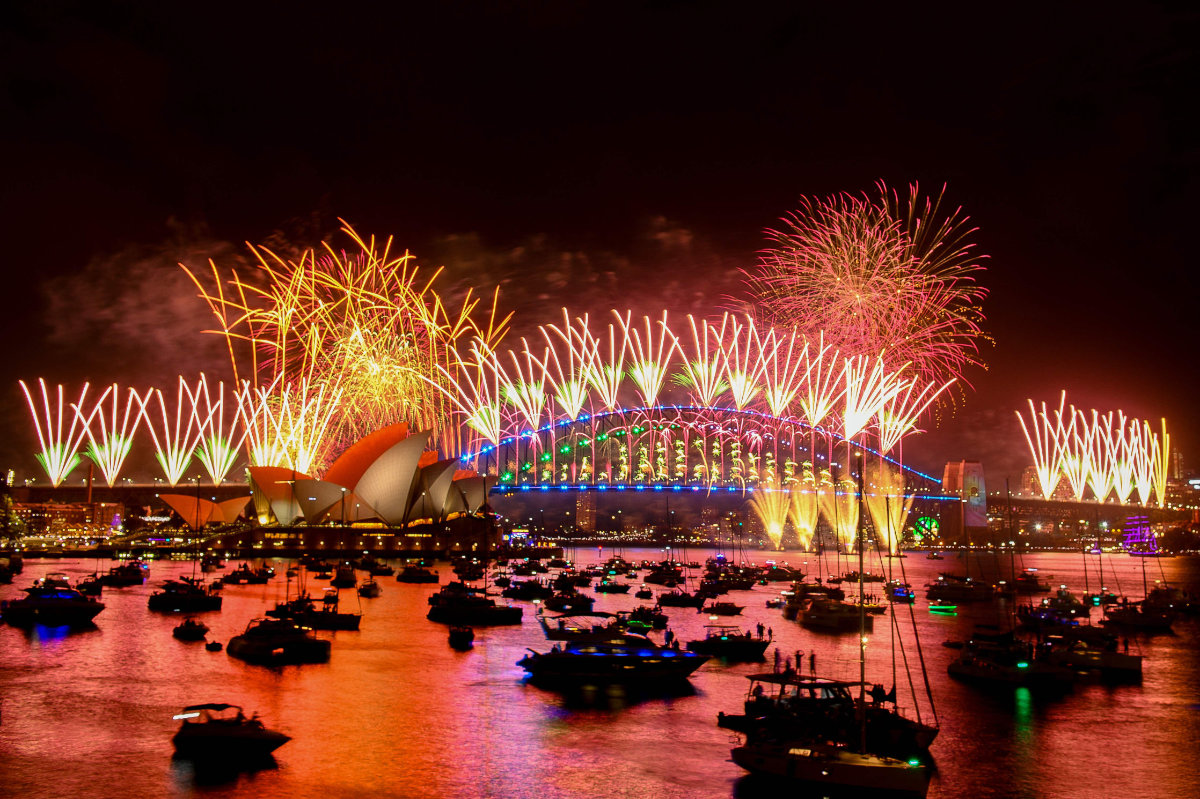
Fireworks explode over the Sydney Harbour Bridge and Sydney Opera House (L) during New Year's Eve celebrations in Australia on January 1, 2024. (AFP)
“It’s total madness,” said German tourist Janna Thomas, who waited in line since 7:30 a.m. to secure a prime waterfront location.
People also lined up early in New York City to nab a spot in Times Square for the midnight ball drop. Officials and party organizers said they’re prepared to keep tens of thousands of revelers safe in heart of Manhattan, as the city has seen near-daily protests sparked by the Israel-Hamas war.

Revellers gather in Times Square during the celebrations of the New Year's Eve in New York City on December 31, 2023. (REUTERS)
FIREWORKS LIGHT UP THE NIGHT
Stunning fireworks displays bloomed at iconic locations like the Acropolis in Athens, Greece, the sleek glass walls of the world’s tallest building, the Burj Khalifa, in the United Arab Emirates, and accompanied a collective cheer filling the air in Nairobi, Kenya.
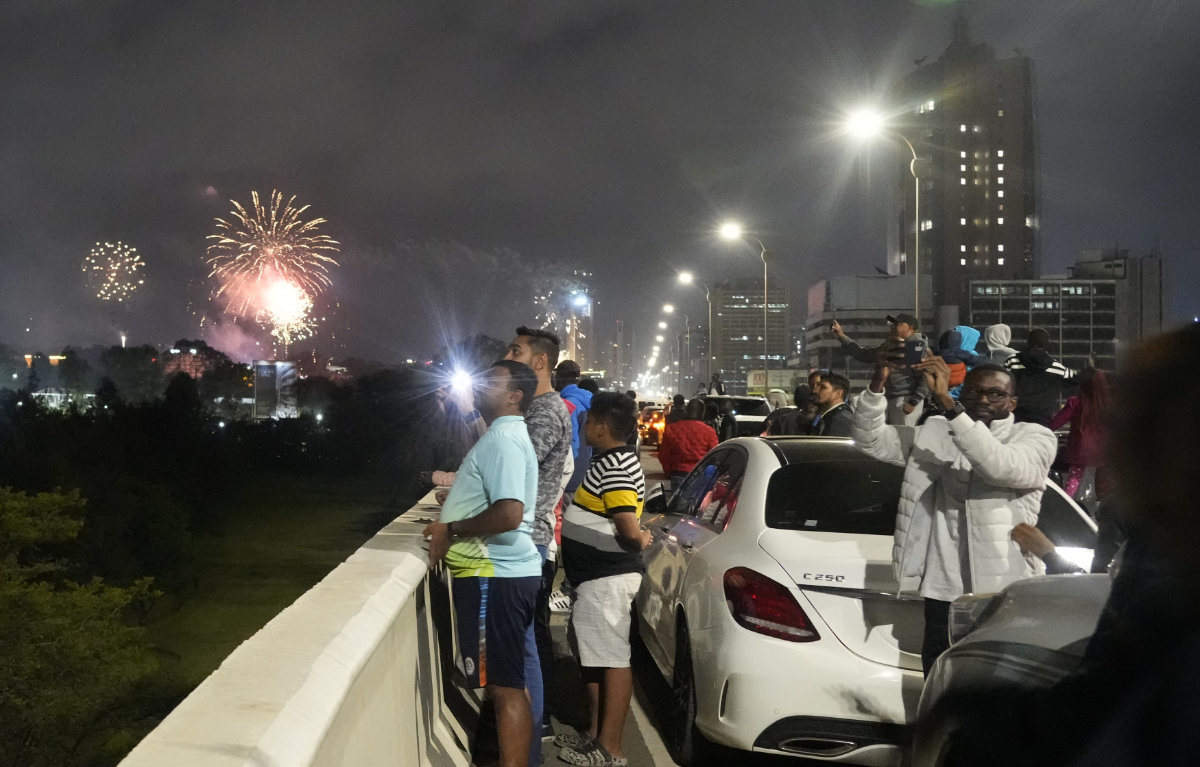
Fireworks explode over the city during New Year's celebrations in Nairobi, Kenya, on Dec. 31, 2023. (AP)
China celebrated relatively quietly, with most major cities banning fireworks over safety and pollution concerns. Still, people gathered and performers danced in colorful costumes in Beijing, while a crowd released wish balloons in Chongqing. During his New Year address, Chinese President Xi Jinping said the country would focus on building momentum for economic recovery in 2024 and pledged China would “surely be reunified” with Taiwan.
In Taipei, Taiwan’s capital, the mood appeared upbeat as revelers gathered for a fireworks show at the bamboo-shaped Taipei 101 skyscraper, as well as at concerts and other events held throughout the city.
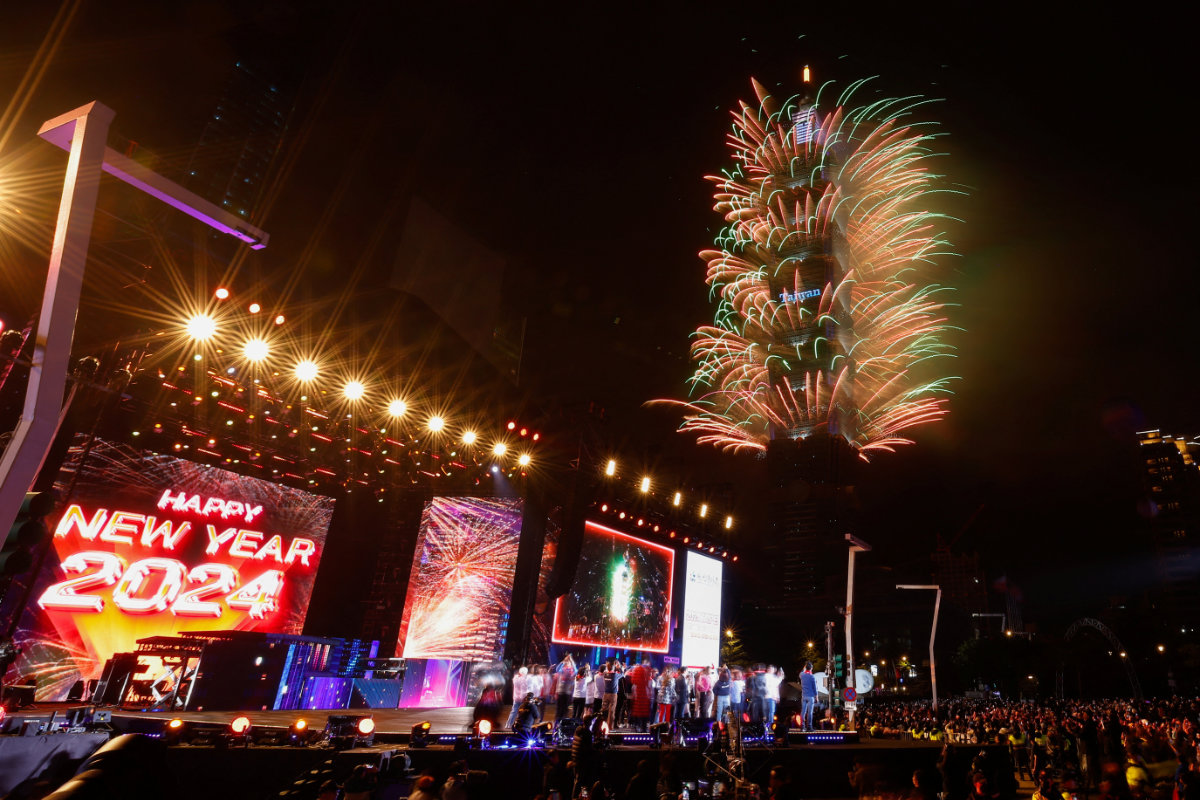
Taiwanese citizens celebrate the arrival of 2024 with fireworks at Taipei 101 Tower in Taipei on January 1, 2024. (REUTERS)
For India, thousands of revelers from the financial hub of Mumbai watched the sun set over the Arabian Sea. In New Delhi, fireworks raised concerns that the capital — already infamous for its poor air quality — would be blanketed by a toxic haze on the first morning of the new year.
Across Japan, people gathered at temples, such as the Tsukiji Temple in Tokyo, where visitors were given free hot milk and corn soup as they stood in line to strike a massive bell.
POPE HIGHLIGHTS THE HUMAN COST OF WAR
At the Vatican, Pope Francis recalled 2023 as a year marked by wartime suffering. During his traditional Sunday blessing from a window overlooking St. Peter’s Square, he offered prayers for “the tormented Ukrainian people and the Palestinian and Israeli populations, the Sudanese people and many others.”
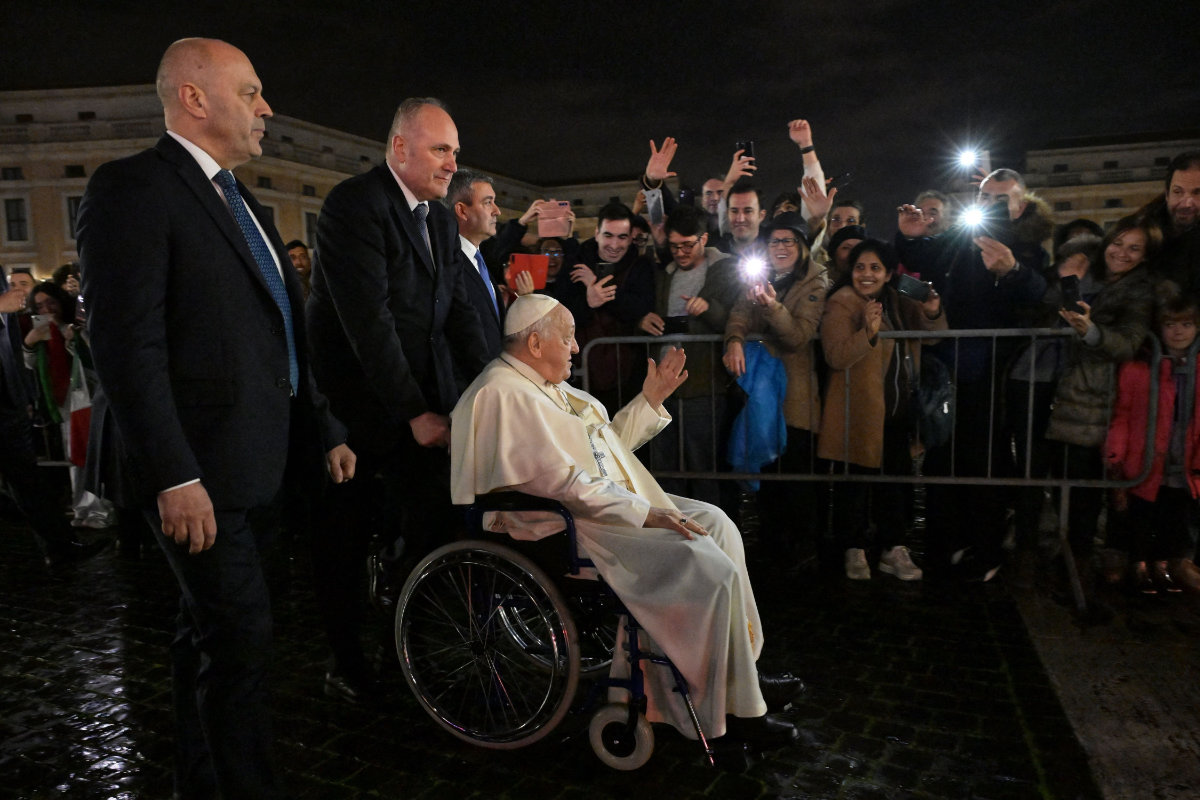
Pope Francis waves to onlookers from his wheelchair at Saint Peter Square in The Vatican on December 31, 2023. (AFP)
“At the end of the year, we will have the courage to ask ourselves how many human lives have been shattered by armed conflict, how many dead and how much destruction, how much suffering, how much poverty,” the pontiff said.
GAZA AND UKRAINE WARS GRIND ON
In Russia, the country’s military actions in Ukraine have overshadowed end-of-year celebrations, with the usual fireworks and concert on Moscow’s Red Square canceled, as they were last year. Even without the festivities, people gathered in the square and some cheered and pointed their phones at a clock counting down the year’s final seconds.

People gather near Red Square in Moscow (left frame) and in front of the St. Sophia Cathedral in Kyiv (right) on New Year's eve, Dec. 31, 2023, amid the Russian invasion of Ukraine. AP/Reuters)
After shelling in the Russian border city of Belgorod Saturday killed 24 people, some local authorities across Russia also canceled their usual firework displays, including in Vladivostok. Millions were expected to tune in to Russian President Vladimir Putin’s New Year’s prerecorded address, where he asserted no force that could divide Russians and stop the country’s development.
Israeli strikes in the Gaza Strip have killed at least 35 people Sunday, hospital officials said, as fighting raged across the tiny enclave a day after Israeli Prime Minister Benjamin Netanyahu said the war will continue for “many more months,” resisting international calls for a cease-fire.
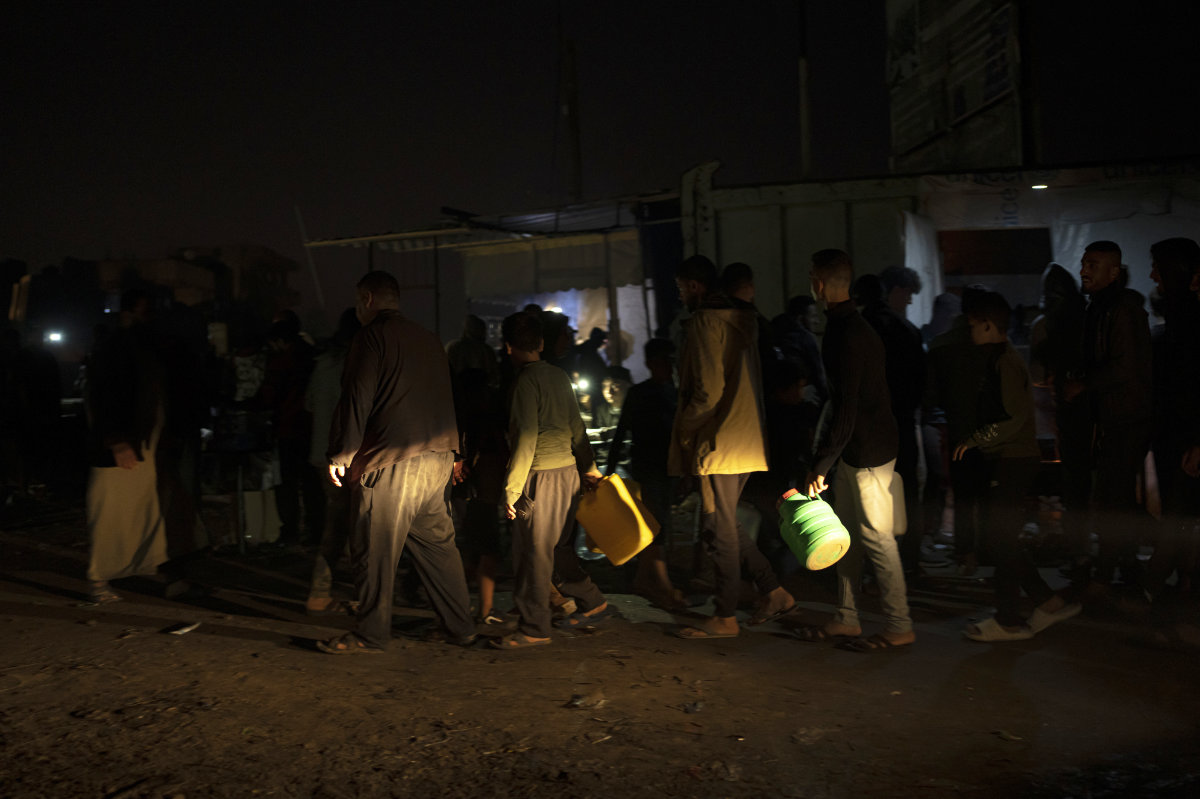
As most of the world joined the New Year's Eve revelry, Palestinians displaced by the Israeli bombardment of the Gaza Strip line up for water at a makeshift tent camp in the Muwasi area on Dec. 31, 2023. (AP)
Skyscrapers in Tel Aviv were lit up in yellow to call for the release of hostages held by Palestinian militants in Gaza for more than 80 days.
“While you are counting down until the new year, our time and our lives stopped,” said Moran Betzer Tayar, the aunt of Yagev Buchshtab, a 34 year old hostage.
In the Gaza Strip, displaced Palestinians huddled around fires in a makeshift refugee camp.
“From the intensity of the pain we live, we do not feel that there is a new year,” said Kamal Al-Zeinaty, who has lost multiple family members in the conflict. “All the days are the same.”
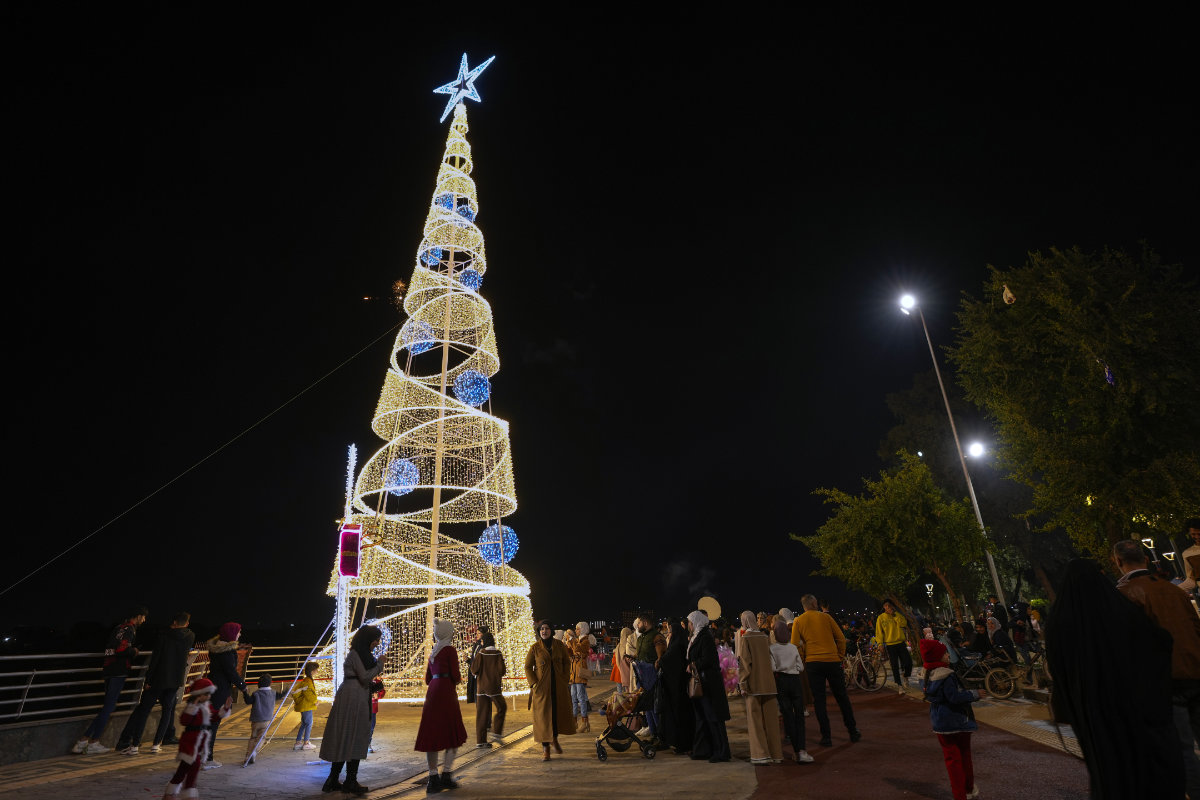
Iraqis gather to celebrate the New Year around a Christmas tree in Baghdad, Iraq, Sunday, Dec. 31, 2023. (AP)
In Iraq, a Christmas tree was decorated with Palestinian flags and symbolic bodies in funeral shrouds, placed beside a liberty monument in central Baghdad. Many Christians in Iraq have canceled this year’s festivities in solidarity with Gaza, and have chosen to limit their celebrations to prayers and rituals.
“We hope that the new year, 2024 will be a year of goodness, prosperity, and joy,” said Ahmed Ali, a Baghdad resident.
In Muslim-majority Pakistan, the government has banned all New Year’s Eve celebrations in solidarity with the Palestinians.
GLOBAL TENSIONS SPUR SECURITY VIGILANCE
New York Mayor Eric Adams said there were “no specific threats” to his city’s annual New Year’s Eve bash. Police said they would expand the security perimeter around the party, creating a “buffer zone” that would allow them to head off potential demonstrations. During last year’s party, a machete-wielding man attacked three police officers a few blocks from Times Square.
Security was also heightened across European cities on Sunday.
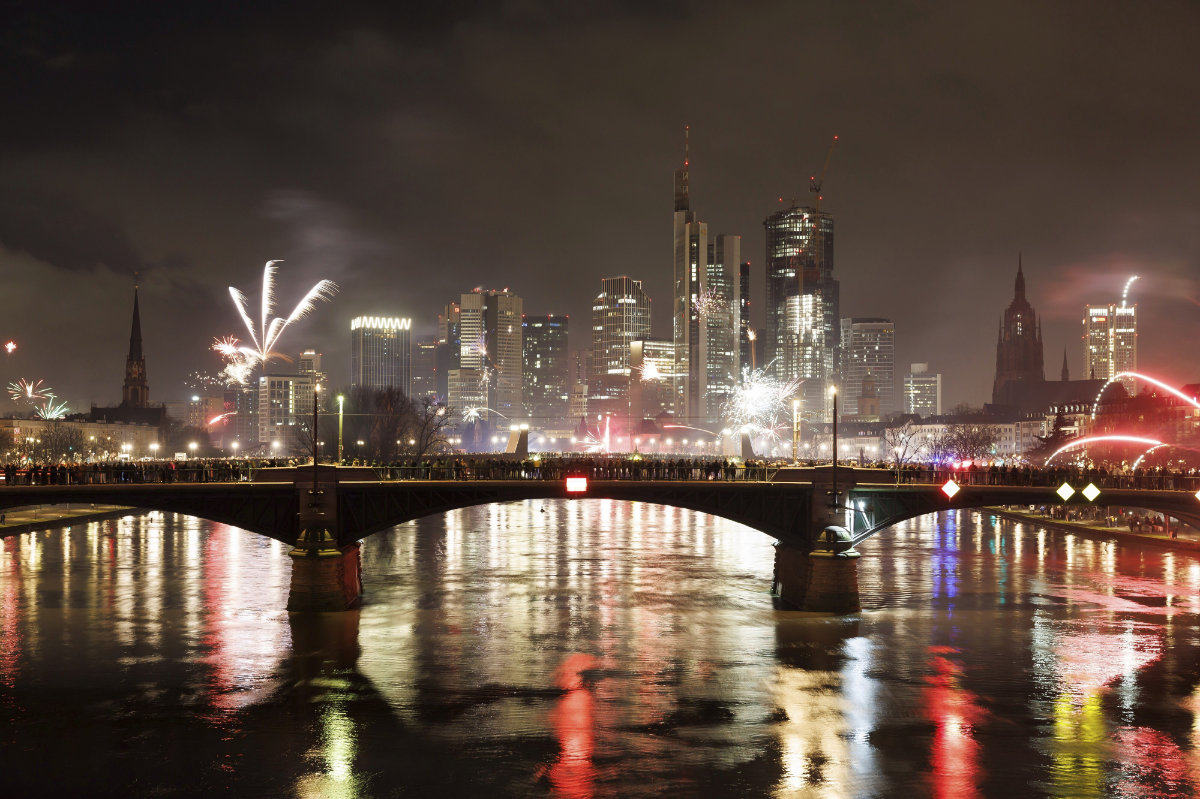
Revelers watch as fireworks explode in the sky over the River Main in Frankfurt, Germany, on Sunday, Dec. 31, 2023. (dpa via AP)
German authorities said they had detained three more people in connection with a reported threat of a New Year’s Eve attack by Islamic extremists on the world-famous Cologne Cathedral.
In Berlin, some 4,500 police officers are expected to keep order and avoid riots like a year ago. Police in the German capital issued a ban on the traditional use of fire crackers for several streets across the city. They also banned a pro-Palestinian protest in the Neukoelln neighborhood of the city, which has seen several pro-Palestinian riots.
In Paris, over 1.5 million people are expected to attend celebrations on the Champs-Elysees, with around 90,000 law enforcement officers would be deployed nationwide, top officials said. Celebrations in the French capital will center on the 2024
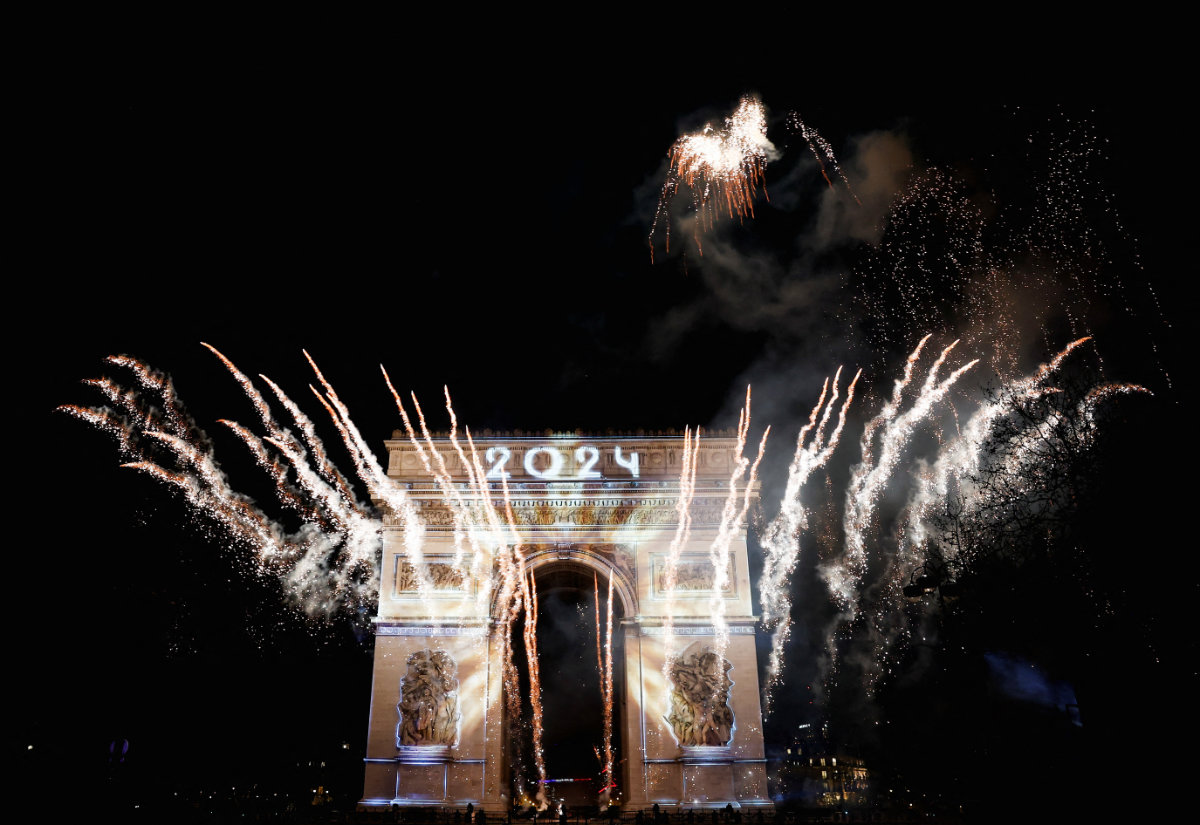
Fireworks illuminate the sky over the Arc de Triomphe during the New Year's celebrations on the Champs Elysees avenue in Paris, France, on January 1, 2024. (REUTERS)
Paris Olympic Games, including DJ sets, fireworks and video projections on the Arc de Triomphe.
In a New Year’s message, French President Emmanuel Macron predicted that the 2024 European Parliament elections will be crucial to Ukraine’s future and the fate of democracy across Europe.





















